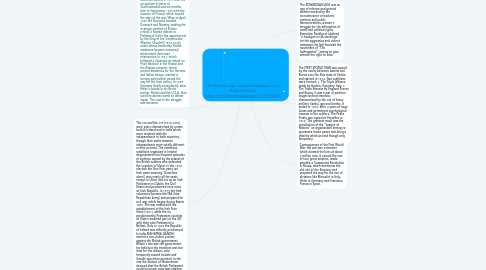The Modern Age: historical background by Roberta Miscia https://www.mindmeister.com/1074195030
作者:Roberta Miscia

1. The 20s and the 30s (1918-1939) were years characterised by unrest both in Ireland and in India which were resolved with the independence of both countries, though their paths towards independence were totally different in their process. The numerous rebellions organised in Ireland degenerated into frequent episodes of violence caused by the attacks of the British soldiers who defended the Loyalists of Ulster. In the 1918 election the Sinn Fein party (an Irish name meaning 'Ourselves alone') won nearly all the seats except in Ulster and set up an Irish Parliament in Dublin, the Dail Eirann and proclaimed once more an Irish Republic. In 1919 the Irish volunteers became the IRA (Irish Republican Army) and prepared for civil war, which began during Easter 1920. The war ended with the establishment of the Irish Free State (1921), while the six predominantly Protestant counties of Ulster remained part of the UK with their own Parliament in Belfast. Only in 1949 the Republic of Ireland was officially proclaimed. In India MAHATMA GANDHI started a non-violent protest against the British government. Britain's aim was self-government for India but the transition was too slow for the Indians, who frequently caused trouble and Gandhi was often arrested. In the end the Statute of Westminster decreed that the British Parliament could no longer pass laws relating to the Dominions unless the Dominion parliaments themselves approved and that the latter were free to legislate for themselves.
2. THE SECOND WORLD WAR: caused by Hitler's ascent to power and his imperialistic aims. His policy of conquest of European countries started in 1938 with the occupation of parts of Czechoslovakia and six months later in September 1939 with the invasion of Poland, which caused the start of the war. When in April 1940 the Germans invaded Denmark and Norway, making the strategic position of Britain critical, a heated debate in Parliament led to the appointment by the King of the Conservative Winston Churchill (1874-1965), under whose leadership British resistance became extremely determined. American intervention in 1941, which followed a Japanese air-attack on Pearl Harbour in the Hawaii and the Russian campain, which proved disastrous for the German and Italian troops, marked a turning point which paved the way for the final victory. In 1945 Germany finally surrendered, after Hitler's suicide in his Berlin bunker. Britain and the U.S.A. then used the atomic bomb to defeat Japan. The cost of the struggle was immense.
3. The EDWARDIAN AGE was an age of reforms and general welfare marked by the recrudescence of workers' protests and public demonstrations, women's struggle for the affirmation of social and political rights. Emmeline Pankhurst (defined "a hooligan in silk stockings" for the aggressive and violent campaign she led) founded the movement of "The Suffragettes", aiming to give women the right to vote.
4. The FIRST WORLD WAR was caused by the rivalry between Austria and Russia over the Slav state of Serbia and started in 1914. Two coalitions were formed: 1. The Triple Alliance made by Austria, Germany, Italy, 2. The Triple Entente by England France and Russia. It was a war of position fought behind trenches, characterized by the use of heavy artillery (tanks), gas and bombs. It ended in 1918, after 4 years of huge losses and permanent psychological traumas in the soldiers. The Peace Treaty was signed at Versailles in 1919. The greatest result was the constitution of the "League of Nations" an organization aiming to guarantee future peace and bring a stability which proved though only temporary.
5. Consequences of the First World War: the war was a monster which claimed the lives of about 9 million men, it caused the ruin of four great empires, made possible a Communist Revolution in Russia, which overthrew the old rule of the Emperor and prepared the way for the rise of dictators like Mussolini in Italy, Hitler in Germany and Francisco Franco in Spain.


